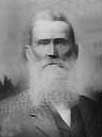Life Sketch of T.J. Moss, Sr.

23 Feb 1842 - 27 Dec 1932
|
Life Sketch of T.J. Moss, Sr.  23 Feb 1842 - 27 Dec 1932 |
|
(The following article was written by J.W. Moss, the subject's son, shortly after his father's death on December 27, 1932 and originally published in the semi-weekly Dallas News (now defunct). It was subsequently published in The Belton Journal, Belton, TX on February 6, 1964.) On Feb. 23, 1842, near Waverly, Humphreys County, Tennessee, Thomas Jefferson Moss was born of sturdy Scotch-Irish parents, where he grew to manhood on his father's farm and in his blacksmith shop. As was the rule then, education of youth was considered of secondary importance. Young Moss therefore obtained only a grammar school education; but he added to his stock of knowledge at every opportunity, until few of his classmates surpassed him in general knowledge of affairs.On April 27, 1861, he enlisted in the Confederate Army as a volunteer in Company A, Eleventh Tennessee Regiment, W.L. White, Captain; G.W. Gordon's Brigade, Cheatham's Division, Polk's Corps, Joseph W. Johnston's Army. He was paroled near Jonesboro, NC, May 26, 1865, after serving four years. One year as a drummer in the military band, but he bore arms the last three years of the war. Besides participating in other hard-fought battles and skirmishes, he was at Chickamauga, Murfreesboro, Missionary Ridge, Franklin, and the siege of Chattanooga. He was neither wounded nor captured during the war. Mr. Moss professed faith in Christ Sept. 14, 1866, united with the Methodist Episcopal Church, South. He was active in his church and other denominations, mostly as choir leader, for more than forty years. He was made a master Mason in November, 1866, and on December 19 that year he married Miss Margaret Catherine Waggoner of Wills Point (now Denver), TN, who was called to her reward May 13, 1914. The couple, with one son, emigrated to Arkansas in the fall of 1871, and located near Searcy, remained there until September 1885, when they, with others, emigrated to Texas and located near Salado, Bell County. Here the ten children grew to maturity within a dozen or so miles of this small, historic village. The parents and five younger children moved to Jackson County, TX in 1893, where they remained seven years, then returned to Bell County. Eleven children were born to them, ten of whom survive: E.L and J.W. Moss, and Mrs. S.D. Hair of Salado, W.W. Moss of Killeen, Mrs. G.B. Lanham of Celina, T.J. Moss, Jr. and Mrs. G.W. Jackson of Holland, D.E. Moss of Krum, Mrs. R.H. Knight of Plainview, and Mrs. S.A. Keeling of Georgetown, in whose home Mr. Moss died of pneumonia December 27, 1932 at age 91. Burial was in Salado Cemetery. Ten children, 61 grand-children and 58 great-grand-children survive him. Although Mr. Moss could have qualified as an "indigent", he did not apply for a pension until objectionable features were removed from his application. Confederate veterans who served through the war are scarce. I know of only one, and one who served a shorter time. If any veteran sees this who knew Mr. Moss in the army, I would be pleased to receive a letter from him. I remember hearing my father say that during a hard-fought engagement a comrade named Beasley fell upon him, exclaiming, "Tom, I'm killed." Upon examination, it was found that both his eyes were shot out. He recovered, but with the loss of both eyes, and they were spared to be together many times after the close of the war. Don't tell me that a boy ever gets entirely away from his home training. The following incident will bear out that contention: During the war, father and several comrades were engaged in a game of cards, when one of them inquired, "What time is it, Tom?" Looking at his watch, Tom replied, "It's exactly 9 o'clock" (that being the usual time for family prayer in my grandfather's home). My father said he told those in the game, "Father is praying for me this minute. So help me God, I'll never deal another card!" And he didn't. After the war and the men were making their way home, my father and a few others of his company chanced to meet a couple of dozen Yankee cavalrymen, who also were homeward bound and partially armed. One of them noticed that my father wore a pair of new boots his father had sent him. The Yankee commanded him, at the point of a pistol to, "Sit down and pull off those new boots. I think they are just my size." He did as the Yankee said (with mental reservations), but was afterward heard to say that the swap would have been negotiated differently had there been assurance that the Yankee's pistol was not loaded, or if he had had one that was. He picked up the worn-out boots discarded by the Yankee and wore them home, and they ruined his feet. Father answered the last earthly roll call without hatred or malice in his heart, and thus ended the earthly career of a brave man. |